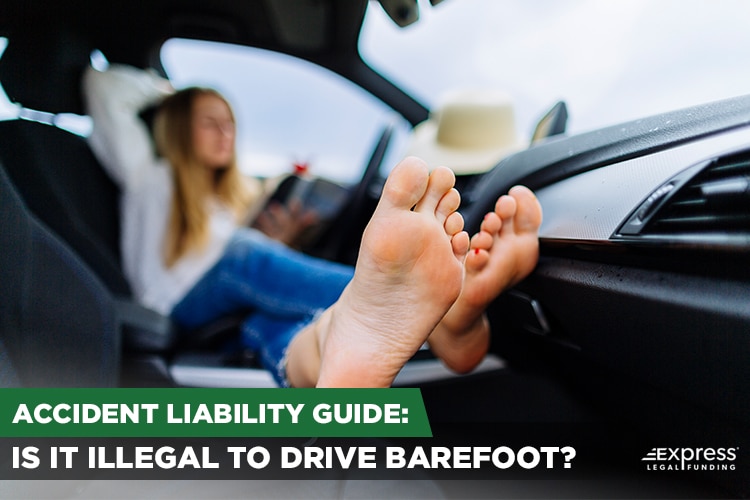
Traffic laws are one part of our society that should be simple enough for everyone to follow, yet there is a disturbing trend of people ignoring these laws for convenience.
Most traffic laws we are expected to follow are about the road and dictate how we must drive our vehicles.
Although the most common traffic laws involve speed limits, right-of-way, and signaling turns, other federal laws and state and local regulations also dictate how we must behave within the confines of our vehicles.
Some examples are not driving under the influence of alcohol, the requirement to fasten our seatbelts, and having airbags installed and ready to deploy.
While some actions might seem harmless, they can inhibit our ability to operate a motor vehicle safely and put others at risk.
One example that springs to mind is texting while driving, a safety hazard that diverts focus from the road and increases the risk of collisions.
Although texting while driving is a primary concern for most law enforcement agencies, there are other behaviors that can make you a dangerous driver.
Even now, you are probably thinking of illegal and negligent behaviors like drunk driving or neglecting the use of essential corrective lenses while behind the wheel of a car.
The thing most people do not ever think about is whether they are permitted to operate their motor vehicles while barefoot. Wearing shoes is such an everyday life factor that few question whether they can explore the wider world without them.
Wearing a pair of sneakers, boots, or even high heels is just an expected part of getting dressed before getting behind the wheel.
Nevertheless, some find shoes uncomfortable and restrictive or are without an intact pair, which leads us to our question: Can you legally drive a motor vehicle while barefoot?
Federal and State Laws: Is Driving Barefoot Illegal?
This question often resonates with motorists across the country. For those in California, the allure of coastal drives might make the freedom of driving barefoot tempting.
Meanwhile, Alabama’s warm climate might encourage a more relaxed approach behind the wheel. However, the legalities are complex and interwoven with both state and federal regulations.
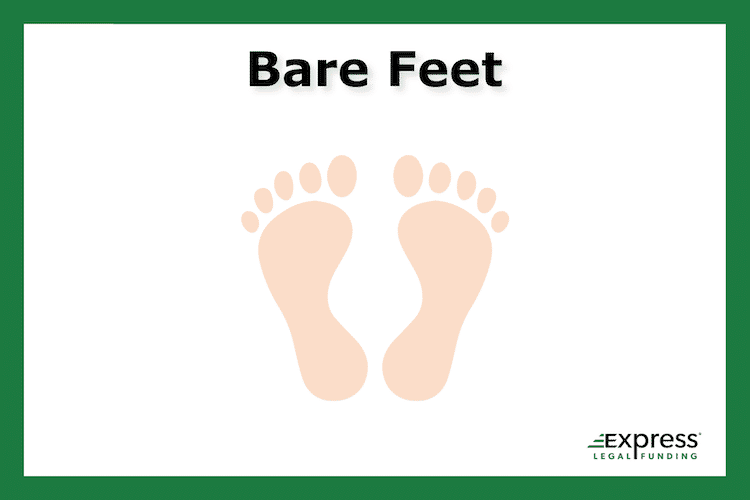
The overarching consensus is that driving barefoot is legal in all 50 states. So, no, it is not illegal for people to operate cars barefoot (not wearing shoes on their feet).
The Story of Jason Heimbaugh and the Legality of Driving Barefoot
This fact was confirmed close to 30 years ago, back in 1994, when a man named Jason Heimbaugh released a report titled, “The (Almost) Definitive Answer to Driving Barefoot in America” about his findings from sending mail out to every state’s DMV (including Washington, DC), one by one, from the deserts of Arizona to the sun-soaked beaches of Florida.
He was surprised to debunk the urban legend and clear the misconception that outright bans on driving barefoot existed.
While motorists in every state, be it the bustling cities of Texas or the tranquil countryside of North Carolina, can technically drive without a pair of shoes, it’s vital to ensure safe driving practices.
No police officer on state trooper on highway patrol, whether patrolling in Indiana or Iowa, would appreciate reporting a car accident because a driver couldn’t properly engage the brake or gas pedal.
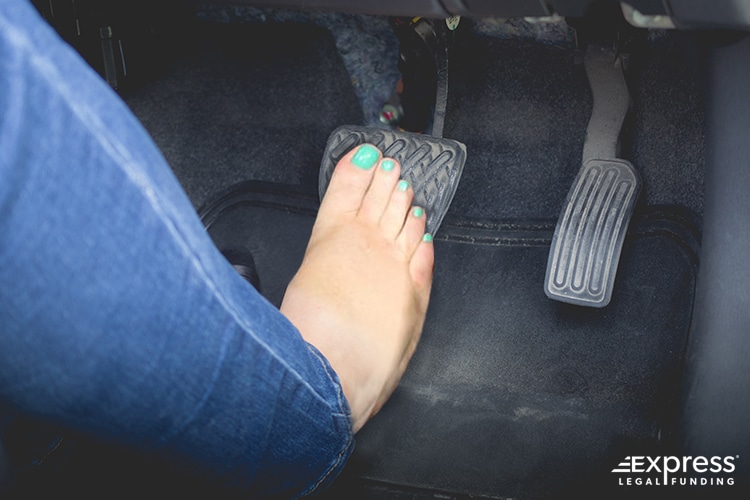
That means the residents of any state could drive across town or on the highway without shoes, which might seem ridiculous to some.
Nevertheless, it is within their rights to do so as long as it does not inhibit their ability to operate the vehicle safely.
Many prefer shoes when driving, not only for comfort but also for ensuring a better grip, especially on crucial controls like the brake pedal. After all, the discomfort of pedals against bare skin could potentially lead to reckless driving.
No one wants to be in a situation where they must explain to their auto insurance or car insurance providers why a barefoot mishap led to their need to file a claim.
Are There Any Laws Against Driving Barefoot?
While driving barefoot may not be directly classified as “illegal,” it’s crucial to understand that certain states could have distinct rules about it.
There are some interesting laws in several states, some of which directly mention wearing shoes, which are as follows:
- Arizona: It’s illegal to drive a vehicle when the driver’s physical control is hindered in any way, so if driving barefoot hampers one’s driving ability, it could be deemed illegal.
- Arkansas: A driver must have full use and control of their faculties, implying that anything (like driving barefoot) shouldn’t impede safe vehicle operation.
- Florida: While not specific to footwear, Florida law emphasizes that drivers must operate their vehicles in a safe manner, which could include wearing appropriate shoes for safety.
- Indiana: Drivers are prohibited from wearing headphones or earbuds in both ears while operating a vehicle, emphasizing the importance of eliminating distractions, which indicates the Indiana law’s strong stance against reckless driving (wearing earphones while driving is legal in most states).
- Massachusetts: No operator of a vehicle shall wear footwear that impedes their ability to operate pedals effectively.
- Wyoming: Motorcyclists are required to wear “appropriate footwear” when operating a motorcycle, emphasizing the significance of foot protection.
Many of these statutes and guidelines emphasize the importance of ensuring that nothing impedes safe driving, not even the lack of a good pair of shoes.
Maintaining safe driving practices is more than just about avoiding fines or a chat with a police officer; it’s also about ensuring that your actions don’t lead to increased auto insurance company premiums or, worse, endanger the lives of fellow motorists.
Putting Their Foot Down: Barefoot Driving Laws by State
Most of these states believe that driving barefoot is safer than driving with loose-fitting types of footwear like flip-flops, but a handful of them have actual legislation that limits who can drive barefoot depending on circumstances, footwear, and the type of vehicle.
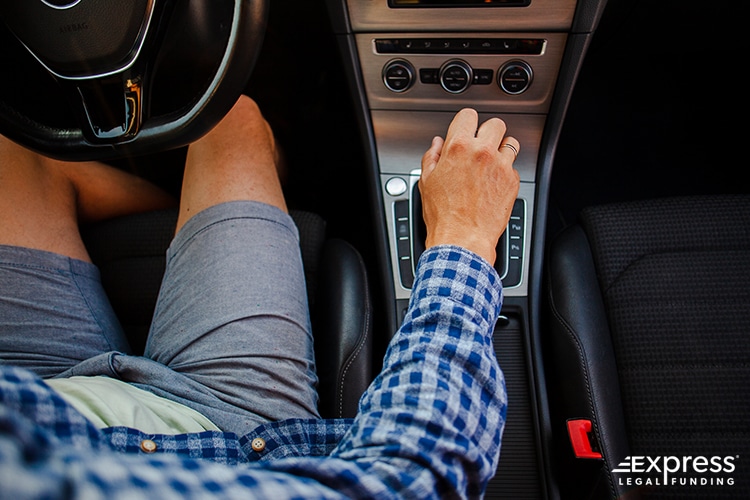
These restrictions are as follows:
- Alabama: Drivers are permitted to operate vehicles without footwear, except for motorcycle drivers and their riders. The Code of Alabama Law Section 32-5A-245 (b) states, “No person shall operate or ride upon a motorcycle or motor-driven cycle unless he or she is wearing shoes.
- Iowa: Any person operating a vehicle with a revoked driver’s license due to OWI (Operating While Intoxicated) offenses is required to wear shoes.
- Minnesota, Kansas, and Missouri: It is legal to drive barefoot in Minnesota, but an interview with a state trooper published in the Duluth News Tribune revealed a caveat. Minnesota state troopers encourage citizens to go barefoot if their only other option is flip-flops since they cause a greater safety risk as these loose-fitting types of shoes are prone to getting stuck in the pedal and inhibiting their control over the vehicle.
The same sentiment about the reckless nature of driving barefoot exists among officials in Kansas and Missouri. - Ohio and Nevada: Ohio encourages using shoes while driving but does not require it by law. That said, Ohio authorities can cite you (give you a ticket) for driving barefoot if they have reasonable evidence suggesting your lack of footwear contributed to a car crash or other accident.
Nevada also enforces this policy and will consider bare feet after an accident as a contributing factor to what led to the car wreck, which comes with a number of negative legal implications that can severely affect the outcomes of personal injury claims. - Michigan: In Michigan, officials have stated that driving barefoot is not inherently dangerous and that calling it “reckless” would be a stretch. Some arguments exist that driving barefoot improves the driver’s control over the vehicle rather than inhibiting it. Still, at the end of the day, no Michigan motor vehicle laws exist that outlaw driving barefoot.
- Tennessee: Tennessee is an interesting example since the state itself does not prohibit driving barefoot. However, officials have pointed out that the individual municipalities in Tennessee are allowed to enforce their own ordinances (this is less the case in some states). Therefore, one part of Tennessee might ban barefoot driving, while another might not have an issue with it.
- Wisconsin: In Wisconsin, driving barefoot is legal and commonplace, as many citizens elect to drive barefoot instead of wearing shoes. An interview with a state trooper was published in the Wisconsin State Journal in which trooper Jim Larson expressed his belief that driving barefoot was safer than doing so with restrictive types of footwear.
Ultimately, you will be hard-pressed to find a place where you cannot drive barefoot, with Tennessee being one of the few where you must check local ordinances by municipality.
That said, you will likely not have to worry about a law that will prevent you from driving barefoot, as it will likely be a non-issue since most people drive with shoes on rather than barefoot.
The situation might be different if you live in a state where driving barefoot might be factored into car crash liability.
The Bare Facts: What Is Liability?
The term “liability” is one of the most important words in the American legal system and is crucial to determining who is responsible for particular issues. Liability is primarily a civil law term that applies to many types of cases, as it is necessary to identify and prove who is responsible for causing another party’s financial loss in a lawsuit where the plaintiff is suing for money.
Civil claims involve a plaintiff filing a claim against the defendant because the latter is believed to be responsible for the situation that harmed the former.
One of the most common types of civil lawsuits in the American justice system is a personal injury claim, and motor vehicle collisions are a leading cause. With hundreds of thousands of claims filed annually, this accounts for a significant portion of our justice system’s resources.
Establishing Liability In Personal Injury Cases
For a personal injury claim to be successful, you need to prove that the other party was responsible for the collision. In car crash cases, this means proving liability and demonstrating that the accident would not have happened if they had been more attentive.
Legally speaking, according to the US Department of Commerce’s Office of Human Resource Management, liability is defined as,
Legal liability for damages due to injuries to other persons, damage to their property, or other damage or loss to such persons (including the expenses of litigation and settlement) resulting from or arising out of any tortuous act, error, or omission of the covered individual.
While liability extends beyond civil claims, its primary function in the court is determining who is responsible for the event that preceded the claim.
This reality is why people and companies purchase personal injury liability insurance coverage to protect themselves from having to pay out of pocket when these types of situations come to pass.
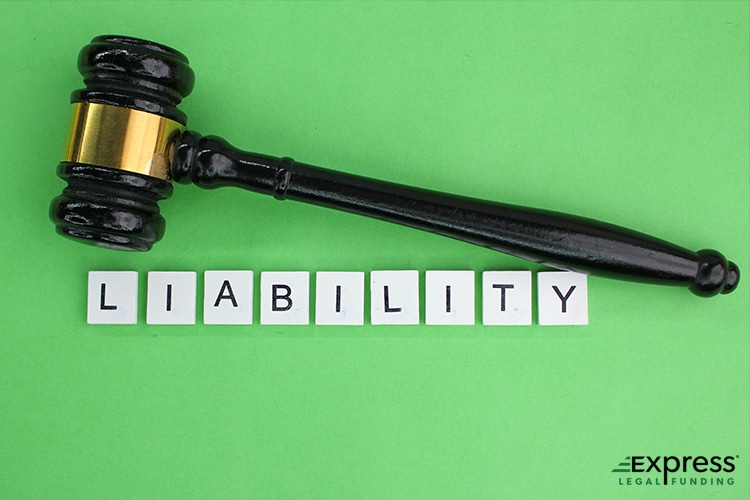
Important: It’s recommended for car accident victims to contact a personal injury lawyer for a free consultation and case evaluation for optimal legal success.
Proving liability is a huge part of motor vehicle collision claims since you must prove that the other driver was negligent while operating their vehicle.
The problem is that proof can be challenging to acquire depending on when, where, and how the accident happened. In some cases, enough evidence makes the claim an open-and-shut argument.
Other times, evidence is so lacking that the debate can take months before liability is proven, and the results might be questionable.
Therefore, proving liability can be a substantial task if the circumstances of your accident do not lend themselves to easily accessible evidence.
The question of proving liability is another matter entirely but worthy of consideration to discuss, especially if you plan on filing a lawsuit.
How Does Driving Barefoot Affect Liability In a Car Accident?
Proving liability is already a significant challenge without mitigating factors, but proving it when dealing with minor details like footwear can be another. When one of the drivers is barefoot while operating a motor vehicle, it might seem like proving liability is more difficult and might draw out a lawsuit.

However, the good news is that most states will not care if one driver is barefoot since most do not believe the absence of proper footwear contributed to the accident.
The bad news is that the situation can change (although not probable) if you are driving in Ohio or Nevada since police officers have the ability to cite you for causing the wreck if they suspect your driving barefoot was a factor that contributed to the car accident (i.e., your foot lacked traction and slipped off the brake pedal).
If your accident occurred in either of those states and you were the barefoot driver, your claim might turn against you.
The accident might seem like a slam dunk for you in every other sense of the word, especially if it is clear that the other driver caused the accident due to the angle of impact.
Unfortunately, not every officer in Ohio or Nevada will agree and might believe that your lack of shoes made you a danger on the road.
With that being said, this is less likely to be a problem if the other driver blatantly caused the accident.
For example, if the other driver has a blood alcohol content exceeding the legal limit or it is determined that they were texting and driving, it is unlikely your lack of shoes will affect the strength of your claim.
Conversely, your lack of footwear might come into play if the cause of the accident is less obvious, and it might have been either driver’s fault.
For example, the lack of footwear might become relevant if one driver runs a STOP sign and T-bones you at a Nevada intersection despite you having the right-of-way.
Since it is harder to prove who ran the STOP sign if there are no witnesses or cameras, the liable driver might argue that you did not have the right-of-way and that your lack of shoes made it harder for you to stop and let them pass.
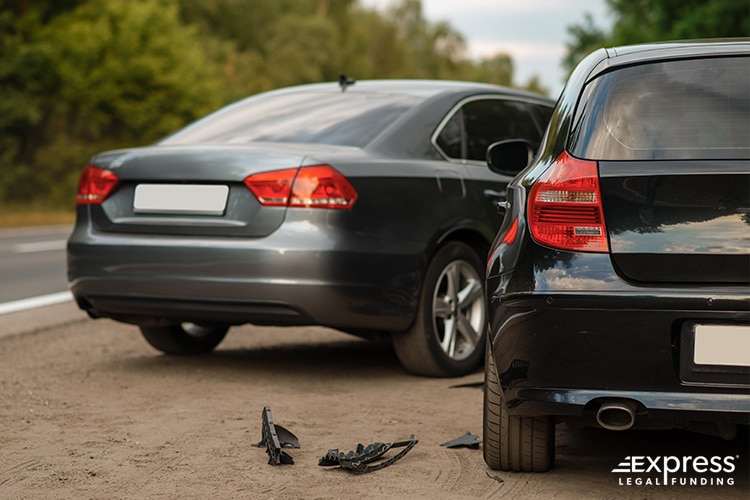
Ultimately, Ohio and Nevada are the worst states to drive barefoot in, with Tennessee as a potential third. Fortunately, 47 other states (including Washington, DC) are more tolerant toward those who prefer driving without shoes.
The question is: How do these states react to drivers who get into crashes that aren’t wearing shoes?
Shoe On the Other Foot: How Do States Handle Barefoot Drivers?
As mentioned, Ohio and Nevada are the main states where barefoot drivers are more likely to face additional scrutiny during personal injury claims. While it is still legal in those states, you might be discouraged since it might reduce your chances of a successful civil claim.
Fortunately, most states do not care and will not view a lack of footwear as grounds to identify you as the liable party.
That said, although legal, some states might be less forgiving if your alternative to regular shoes compromises your control over your car’s pedals, which leads us to the next question.
Is It Illegal To Wear Flip-Flops While Driving?
No, in most states, it is not illegal to wear flip-flops while driving. However, some states believe that shoes like flip-flops, wedge heels, and high heels can reduce your control over the car, which can lead to your being cited for reckless driving and causing a motor vehicle accident.
Therefore, going barefoot is preferable and will pose fewer legal implications than using those types of loose and unwieldy shoes.

This concept is particularly the case and the reason why you may be better off from a legal perspective going barefoot if the only shoes you have access to are flip-flops in Missouri, Kansas, Michigan, Wisconsin, or Minnesota.
Why Are Flip-Flops and High Heels Dangerous To Wear While Driving?
The following characteristics of flip-flops and high-heels (including wedge heels) are what make them less ideal from a safe driving perspective:
- Flip-flops are loose-fitting and use straps to secure them to the feet. Those straps could get caught on the pedal and prevent you from moving your foot to accelerate or slow down as necessary.
- High heels are difficult to walk in and reduce fine motor control since those who wear them need to focus more on balance. Attempting to control a vehicle’s pedals while wearing them can be almost impossible, making it safer in some cases to go barefoot instead.
As a result of these policies, it is unlikely for most barefoot drivers to experience complications in their personal injury claims.

Only those who wear the footwear deemed “unsafe” might experience any kind of comments from the authorities or other officials.
Nevertheless, personal injury claims can quickly become expensive when piled onto the daily cost of living.
Closing Statements About the Legality of Barefoot Driving
We at Express Legal Funding know how challenging lawsuits can be, especially when part of the problem appears to be the type or lack of footwear being worn at the time of the accident.
Reading this article has made it clear that driving barefoot is not illegal. However, it could complicate proving you are not liable for an accident.
Even when you successfully prove another party is responsible for the car accident, you can expect to deal with injuries, loss of income, and additional expenses, which, for many people, can quickly put them in a financially tenuous situation.
That is where we, as a legal funding company, are ready to come in and help by providing pre-settlement advances for people while they wait for their cases to be settled or won.
We understand you may require funds to pay for your expenses and can’t wait any longer for your claim to finally end so you can recover settlement money for your loss.
How Lawsuit Funding Works
The premise of legal funding is that people with an ongoing legal claim against another party (meaning they are suing for money) can sell us, the pre-settlement funding company, a portion of the potential case proceeds they hope to recover.
Our buying a stake in the case proceeds is a non-recourse advance/purchase agreement since we only get paid for what we are owed if the claim is successful.
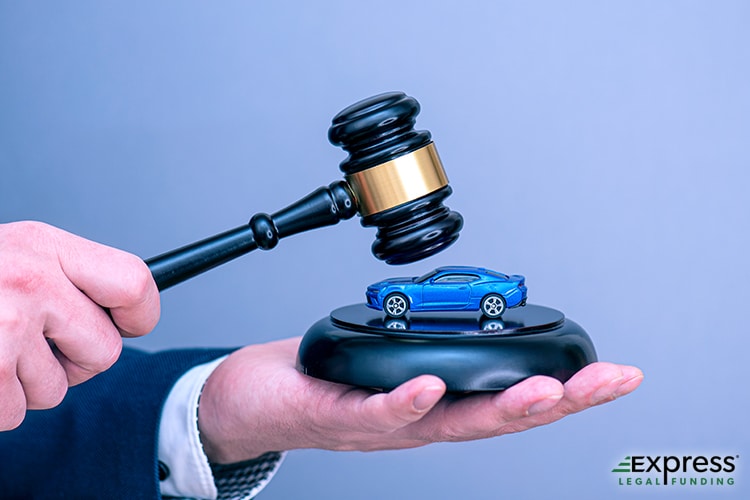
That means the person who got funding from us recovered a settlement or court award from another party, which is not the case with a loan.
In other words, people who obtain legal funding (by placing a lien against a portion of their claim) but unfortunately do not receive a favorable payout at trial or via a settlement do not have to pay any of the funds they got advanced to them.
The money will remain theirs to keep (essentially, no questions asked). That translates to risk-free.
So, if this sounds similar to the challenging financial situation you find yourself in and you need money now and not merely later at an unknown date when your case comes to an end, you should give us a call to apply for and learn more about how legal funding can help you out when you need it most.
Call us or apply online anytime 24/7. Our team at Express Legal Funding works fast. Whether you were driving barefoot or not, we look forward to doing what we can to help.
